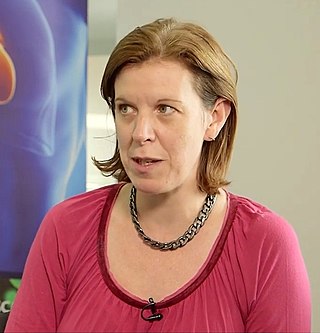
Herd immunity is a form of indirect protection that applies only to contagious diseases. It occurs when a sufficient percentage of a population has become immune to an infection, whether through previous infections or vaccination, thereby reducing the likelihood of infection for individuals who lack immunity.
This is a timeline of the development of prophylactic human vaccines. Early vaccines may be listed by the first year of development or testing, but later entries usually show the year the vaccine finished trials and became available on the market. Although vaccines exist for the diseases listed below, only smallpox has been eliminated worldwide. The other vaccine-preventable illnesses continue to cause millions of deaths each year. Currently, polio and measles are the targets of active worldwide eradication campaigns.

The schedule for childhood immunizations in the United States is published by the Centers for Disease Control and Prevention (CDC). The vaccination schedule is broken down by age: birth to six years of age, seven to eighteen, and adults nineteen and older. Childhood immunizations are key in preventing diseases with epidemic potential.

Pneumococcal vaccines are vaccines against the bacterium Streptococcus pneumoniae. Their use can prevent some cases of pneumonia, meningitis, and sepsis. There are two types of pneumococcal vaccines: conjugate vaccines and polysaccharide vaccines. They are given by injection either into a muscle or just under the skin.
Immunization during pregnancy is the administration of a vaccine to a pregnant individual. This may be done either to protect the individual from disease or to induce an antibody response, such that the antibodies cross the placenta and provide passive immunity to the infant after birth. In many countries, including the US, Canada, UK, Australia and New Zealand, vaccination against influenza, COVID-19 and whooping cough is routinely offered during pregnancy.

Katherine "Kate" L. O'Brien is a Canadian American pediatric infectious disease physician, epidemiologist, and vaccinologist who specializes in the areas of pneumococcal epidemiology, pneumococcal vaccine trials and impact studies, and surveillance for pneumococcal disease. She is also known as an expert in infectious diseases in American Indian populations. O’Brien is currently the Director of the World Health Organization's Department of Immunization, Vaccines and Biologicals.

George Rainer Siber is a medical researcher and vaccine expert with 49 years of experience in developing numerous vaccines, therapeutic antibodies, and diagnostic agents for infectious diseases.
Vaccine shedding is a form of viral shedding which can occasionally occur following a viral infection caused by an attenuated vaccine. Illness in others resulting from transmission through this type of viral shedding is rare. Most vaccines are not attenuated vaccines, and therefore cannot cause vaccine-induced viral shedding, though the idea of shedding is a popular anti-vaccination myth.
Kathleen Maletic Neuzil is the Director of the Center for Vaccine Development at the University of Maryland School of Medicine. She was elected to the National Academy of Medicine in 2019.

Dame Sarah Catherine Gilbert FRS is an English vaccinologist who is a Professor of Vaccinology at the University of Oxford and co-founder of Vaccitech. She specialises in the development of vaccines against influenza and emerging viral pathogens. She led the development and testing of the universal flu vaccine, which underwent clinical trials in 2011.

Arnold Monto is an American physician and epidemiologist. At the University of Michigan School of Public Health, Monto is the Thomas Francis, Jr. Collegiate Professor Emeritus of Public Health, professor emeritus of both epidemiology and global public health, and co-director of the Michigan Center for Respiratory Virus Research & Response. His research focuses on the occurrence, prevention, and treatment of viral respiratory infections in industrialized and developing countries' populations.

Vaccination in Brazil includes all the practice and social issues related to vaccines in Brazil.
The Strategic Advisory Group of Experts (SAGE) is the principal advisory group to World Health Organization (WHO) for vaccines and immunization. Established in 1999 through the merging of two previous committees, notably the Scientific Advisory Group of Experts and the Global Advisory Group by Director-General of the WHO Gro Harlem Brundtland. It is charged with advising WHO on overall global policies and strategies, ranging from vaccines and biotechnology, research and development, to delivery of immunization and its linkages with other health interventions. SAGE is concerned not just with childhood vaccines and immunization, but all vaccine-preventable diseases. SAGE provide global recommendations on immunization policy and such recommendations will be further translated by advisory committee at the country level.
Helen Aspasia Petousis-Harris is a New Zealand vaccinologist and associate professor in the Department of General Practice and Primary Health Care at the University of Auckland. She has been involved in research related to vaccination in New Zealand since 1998, with her main areas of focus being vaccine safety and effectiveness. Petousis-Harris has had a variety of lead roles in New Zealand and international organisations that focus on vaccination and is a regular media spokesperson in this field, especially during the COVID-19 pandemic.
African Leadership in Vaccinology Expertise(ALIVE), is a South African Department of Science and Technology/National Research Foundation Flagship Initiative at the University of Witwatersrand, Johannesburg, established in 2016. It was co-founded by professor of vaccinology Shabir Madhi and runs an 18-month Master of Science in Medicine in the field of Vaccinology. Its members have been contributing to COVID-19 vaccine trials in South Africa during the COVID-19 pandemic.
The National Advisory Group on Immunization (NAGI), in South Africa, established in 1993 advises the National Department of Health on issues pertinent to vaccination and infectious diseases. It makes recommendations on vaccine formulations and vaccination schedules.

Daniela M. Ferreira is a Brazilian British immunologist. She is a specialist in bacterial infection, respiratory co-infection, mucosal immunology and vaccine responses. She is currently Professor of Respiratory Infection and Vaccinology at the Oxford Vaccine Group in the Department of Paediatrics at the University of Oxford and the Director of the Liverpool Vaccine Group at the Liverpool School of Tropical Medicine. She leads a team of scientists studying protective immune responses against pneumococcus and other respiratory pathogens such as SARS-CoV2. Her team has established a novel method of inducing pneumococcal carriage in human volunteers. They use this model to:

Susanna Jane Dunachie is a British microbiologist who is Professor of Infectious Diseases at the University of Oxford. Her work considers microbiology and immunology to better understand bacterial infection and accelerate the development of vaccines. She has focused on melioidosis, scrub typhus and tuberculosis. During the COVID-19 pandemic, she studied T cell immunity to severe acute respiratory syndrome coronavirus 2.
Helen Siobhan Marshall is an Australian medical researcher who is Professor of Vaccinology at the University of Adelaide. She was named the South Australian of the Year for 2022.
Cheryl Cohen is a South African public health researcher who is a professor at the University of the Witwatersrand. She looks to develop evidence-based policy to reduce the burdens of respiratory diseases. During the COVID-19 pandemic. Cohen investigated the rates of COVID-19 in South Africa.










